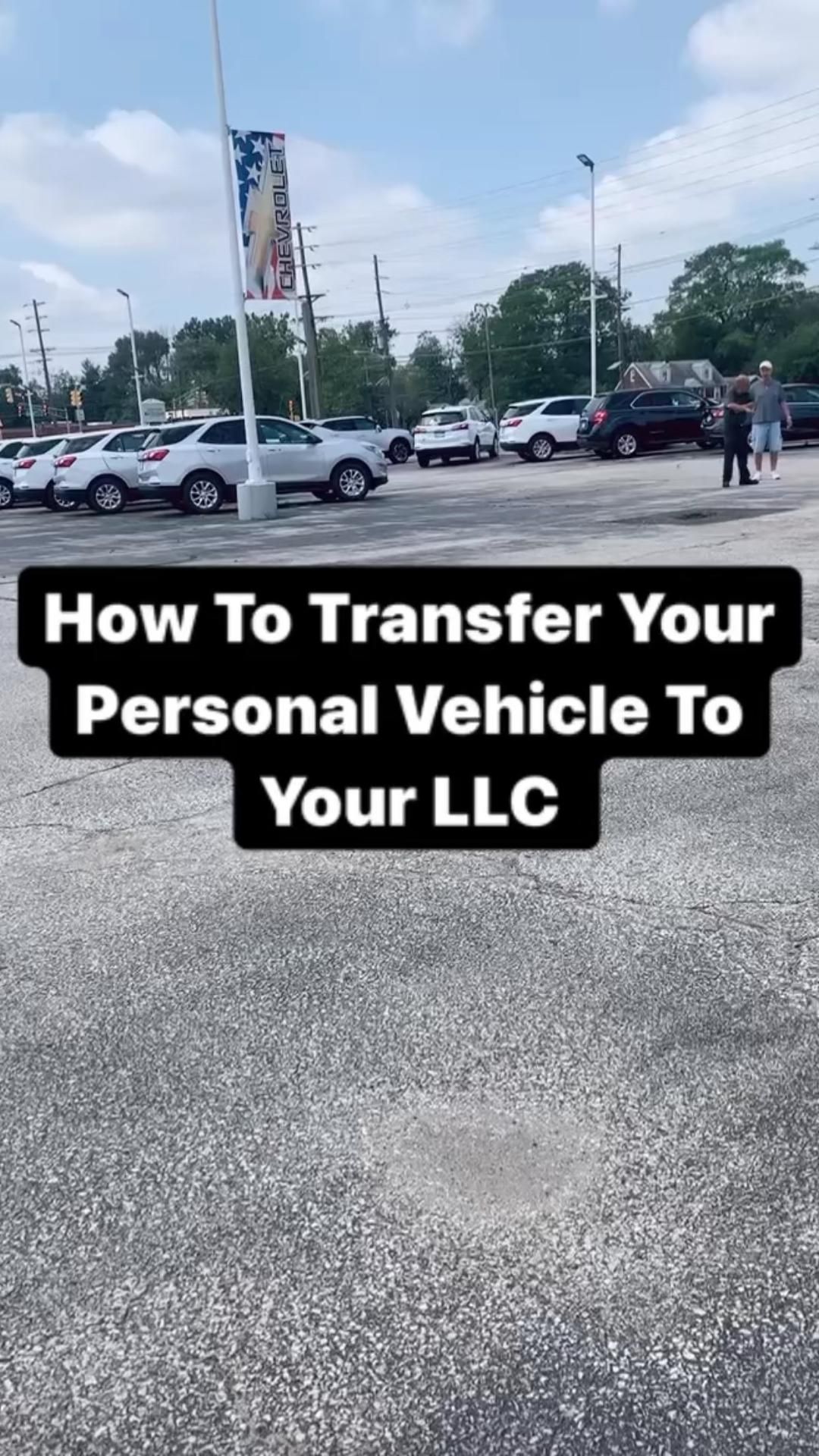How to Transfer Personal Car to Llc
To transfer a personal car to an LLC, title the vehicle in the name of the LLC and complete a bill of sale. Consult with your DMV and a tax advisor to navigate state-specific requirements and potential tax implications.
Transferring a personal car into an LLC is a strategic move often made for liability protection and tax benefits. Understanding the correct process to retitle your vehicle under your LLC is crucial. Engage with your state’s Department of Motor Vehicles (DMV) for detailed instructions, as regulations vary by location.
You’ll need to prepare the necessary documentation, which generally includes a bill of sale, the car title, and an LLC operating agreement. Ensure all forms are accurately filled to avoid unnecessary setbacks. Keep in mind that this action might have tax consequences; therefore, a consultation with a tax professional is highly recommended. A seamless transition hinges on meticulous attention to legalities and proper record-keeping.
The Benefits Of Transferring A Personal Car To An Llc
Transferring a personal car into an LLC can enhance your business profile while offering key financial and legal perks. Understand the advantages this strategy provides for smart business owners.
Tax Advantages And Deductions
Shifting a personal vehicle into your company’s ownership structure unlocks potential tax benefits. With proper documentation, the LLC can write off expenses linked to the car.
- Gasoil and maintenance costs could be deductible
- Depreciation of the vehicle can be written-off
- Interest on car loans may reduce taxable income
Every business trip becomes a chance to save on taxes. Keep detailed logs for compliance and maximum savings.
Limiting Personal Liability
Adding your vehicle to an LLC serves as a shield for personal assets. Accidents or legal disputes involving the car are issues for the LLC, not you personally.
| Personal Ownership | LLC Ownership |
|---|---|
| Risks personal assets | Protects personal assets |
| Liability for car-related lawsuits | LLC absorbs liability |
| Limited tax benefits | Expanded tax deductions |
An LLC owning the car implies separation of assets. Your personal finances stay untouchable in most legal scenarios.
Eligibility Criteria For Transferring A Car To An Llc
Thinking of moving your car into your LLC? A smart move. Holding assets like vehicles through a limited liability company (LLC) can bolster tax efficiencies and shield personal assets. But wait, not all cars can join your LLC fleet. Certain rules must be met. Let’s check if your beloved four-wheeler qualifies.
Ownership Prerequisites
First things first, do you own the car outright? If there’s a loan, it complicates things. Lenders may need to give the nod. After all, they have a say while the car is under finance. Personal loans make it tricky as well. They are not fans of assets slipping into business entities.
Llc Compliance And Restrictions
Compliance is king for an LLC car transfer. Your LLC must be active and in good standing. This means all paperwork and fees with the state are up to date. The car must serve the LLC’s business purpose – no personal joyrides on company time. Insurance must also transition to a commercial policy. Some states restrict certain vehicle types. Ensure your car meets state-specific LLC vehicle guidelines.
Pre-transfer Preparations And Considerations
Transferring a personal car to an LLC involves key steps before the actual transfer. Proper preparations ensure compliance with legal and financial guidelines. Understand the vehicle’s value and insurance changes.
Evaluating The Car’s Fair Market Value
Determining the fair market value (FMV) of your car is crucial. FMV informs the sales price you should list in the transfer documents. Use reliable sources to assess this value:
- Kelly Blue Book – A trusted vehicle valuation source.
- NADA Guides – Provides up-to-date car values.
- Local Dealerships – Offer comparison for pricing.
Document the FMV thoroughly. This supports the transfer’s integrity.
Inspecting Insurance Implications
Insurance aspects demand attention. Personal car insurance differs from commercial. Ensure coverage transitions smoothly:
| Contact Insurer | Discuss LLC coverage needs and options. |
|---|---|
| Review Policies | Assess different plans that cover business use. |
| Compare Quotes | Find a plan with optimal coverage and costs. |
Updating insurance is mandatory before transferring the vehicle. Skipping this step can lead to coverage issues post-transfer.
Step-by-step Process Of The Transfer
Transferring a personal car to an LLC is like moving a piece-of-chess on a board. Smart but strategic. Let’s master the game. Follow this guide to glide your shiny car smoothly from your name to your business entity’s garage.
Title Transfer Documentation
Boldly grab your pen and documents. The quest begins with title transfer paperwork. It’s like a treasure map leading to new ownership.
- Title certificate: Ensure you have the current, filled out with the LLC’s name.
- Odometer disclosure: It shows the car’s mileage. Truth is key.
- Bill of Sale: It’s a proof of the sale, crystal clear in detail.
- LLC formation documents: They prove the LLC’s existence in the real world.
Notifying The Department Of Motor Vehicles (dmv)
Adventure to the DMV’s realm with your documents. A notice to them is a final, critical step. It’s like sending a raven in the world of knights and castles.
- Visit your local DMV office: They’re the gatekeepers of car transfers.
- Present your documentation: Show them your map and treasures you’ve collected.
- Pay the required fees: Every kingdom has its toll. Fulfill it to pass the gates.
- Update registration and plates: This might be needed if the realm’s laws demand.
By following these simple steps, your car’s allegiance can switch to your LLC without any bewitchment. Your horseless carriage is now ready to serve your business quest.
Post-transfer Modifications And Responsibilities
Transferring your personal car to an LLC involves key steps beyond the initial paperwork. Once the vehicle is under the LLC’s name, you must address insurance updates and financial distinctions. These steps keep both you and your business protected. Let’s explore the crucial changes you need to make after the transfer.
Updating Insurance Policies
After transferring the car title to your LLC, updating the insurance policy is a must. Here’s how to ensure proper coverage:
- Contact your insurance provider: Inform them about the change in ownership.
- Adjust the policy: Switch to a commercial vehicle insurance plan.
- Compare quotes: Check for the best rates from different insurers.
- Confirm coverage details: Ensure the policy meets your business’s needs.
Maintaining Separate Financial Records
Keeping your LLC’s finances separate from personal funds is crucial. Here’s a brief guide:
| Document | Importance |
|---|---|
| Vehicle expenses: | Log all car-related expenditures for tax purposes. |
| Mileage records: | Track business use for accurate deductions. |
| Maintenance receipts: | Keep proof of upkeep to show proper vehicle care. |
| Loan documents: | If applicable, retain loan agreements under the LLC. |
Implement these steps to ensure transparency and limit liability. Document every transaction meticulously for a clear business history.

Credit: m.youtube.com
Potential Pitfalls And How To Avoid Them
Transferring a personal car to a Limited Liability Company (LLC) is a savvy move for business owners. But, it’s not as straightforward as signing over a title. Several pitfalls can overturn the transfer process. Understanding them is crucial for a smooth transition.
Avoiding Commingle Of Funds
To maintain the integrity of your LLC, keep personal and business assets separate. Here is why and how:
- Legal Protection: An LLC shields personal assets from business debts. Mixing assets blurs these lines and dilutes legal protection.
- Clear Financial Records: Separate accounts make tax filing and bookkeeping simpler.
To avoid commingling:
- Transfer the vehicle strictly through company accounts.
- Use business checks or credit for all vehicle-related expenses.
- Consult with an accountant to document the transfer accurately.
Handling State-specific Nuances
Each state has unique rules for vehicle transfer to an LLC. These vary widely and ignoring them can lead to issues.
For example:
| State | Requirement |
|---|---|
| California | Annual LLC fees and smog certification. |
| New York | LLC publication and insurance adjustments. |
Tips for handling state nuances:
- Consult your local DMV website for state-specific procedures.
- Get advice from a local attorney familiar with LLC vehicle transfers.
- Ensure compliance with insurance requirements in your state.
Remember, each wrong step can complicate your asset protection. No need for this risk. Careful planning and professional advice make the process trouble-free.
Frequently Asked Questions Of How To Transfer Personal Car To Llc
How Do I Put My Personal Car In My Business Name?
To put your car in your business name, title the vehicle in the company’s name, transfer the title at the DMV, and ensure insurance coverage reflects the business as the owner. Consult with an accountant regarding tax implications.
Can I Refinance My Car Into My Business Name?
Yes, refinancing your car into your business name is possible if you have company credit or are willing to offer a personal guarantee. Check with lenders for specific requirements.
What Are The Benefits Of Putting A Car In Your Business Name?
Putting a car in your business name can lead to tax deductions, enhance your company’s image, and provide better financing options. It also allows for potential advertising opportunities and may result in lower insurance premiums due to commercial rates.
Can I Put My Car Payment On My Business?
Yes, you can typically put your car payment on your business if the vehicle is for business use. Ensure you keep accurate records for tax purposes and consult with an accountant.
Conclusion
Transferring your personal car to an LLC involves a few steps, but it’s manageable. Always consult with a legal expert to navigate state regulations and ensure all paperwork is thorough. By making this smart move, your asset protection is strengthened.
Don’t forget to update your insurance accordingly and enjoy the peace of mind your decision brings.







